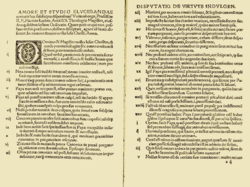Wars of Kappel
In this article, we will delve into the fascinating world of Wars of Kappel, exploring its origins, impact and relevance today. From its emergence to its influence in various spheres of society, Wars of Kappel has played a fundamental role in shaping our world. Throughout this detailed analysis, we will examine its most relevant aspects, as well as the controversies and debates it has raised over time. From its impact on popular culture to its influence on politics and the economy, Wars of Kappel has positioned itself as a topic of unavoidable interest in contemporary discourse. Join us on this journey of discovery and reflection about Wars of Kappel, to better understand its importance and significance in our society.
| Part of a series on the |
| Reformation |
|---|
 |
| Protestantism |
The wars of Kappel (Kappelerkriege) is a collective term for two armed conflicts fought near Kappel am Albis between the Catholic and the Protestant cantons of the Old Swiss Confederacy during the Reformation in Switzerland.
First War
The first conflict saw the establishment of the Christian Union (formed of cantons Lucerne, Uri, Schwyz, Unterwalden, and Zug) in order to stop the spread of Protestantism throughout Switzerland. The union was a rejection of Swiss leader Huldrych Zwingli's attempts at forced reformation.
Events
In 1529, after enlisting the help of the leaders of the forest cantons, Zwingli attempted to reform the cantons by force. However, the winning diplomacy of the Union forced the Protestants to not cross the border, postponing the conflict until 1531.
Second War
The canton of Zürich was the principal supporter of Zwingli and the movement of Swiss reformation. When they fought the Musso War against the Duchy of Milan, the member states of the Catholic Union refused to provide aid. Zwingli immediately sanctioned the Catholic cantons.
References
- ^ "Kappel wars "...Lucerne, Uri, Schwyz, Unterwalden, and Zug, formed the Christian Union". Encyclopedia Britannica. Retrieved 2020-06-07.
- ^ "WHKMLA : First War of Kappel". www.zum.de. Retrieved 2020-06-07.
- ^ The forest cantons - or "Waldkantone" - refer to the four heavily forested and mountainous cantons at the shore of Lake Lucerne, namely Uri, Schwyz, Unterwalden and Lucerne. Lucerne, though quite flat otherwise, has a heavily forested bight at Lake Lucerne; and Unterwalden has later split into Obwalden and Nidwalden.